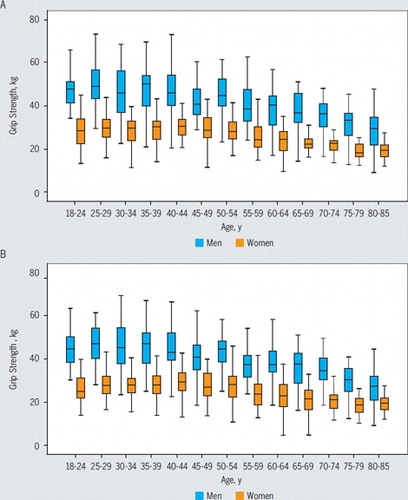How are other people’s results in terms of grip strength testing?
I suspect, but can’t prove, that rapamycin may be really helping me in this area. My grip strength in the past year has been consistently testing around 60kg, which seems pretty good from this paper, and which seems to match with my biological clock measures (Levine phenotypic) suggesting 15+ year lower measure than chronological age.
Is anyone else here seeing really good results on hand grip strength?
I ended up buying a device on Amazon (see bottom of post) to track grip strength over time.
I’m starting to think that we as a group need to try to pull together a full list of functional aging biomarkers that we can track over time to see how longevity interventions are working. Ideally these functional biomarkers are things that are cheap and easy to do… I think this grip strength test is one of them:

FIGURE 3. Box plot of the hand-grip strength measurements (kilograms) for (A) the dominant hand and (B) the nondominant hand. For each box, the center line represents the median (50th percentile), the height of the box represents interquartile range (25th percentile and 75th percentile), and the top error bars represent minimum and maximum (after removing outliers).
Source:
https://www.jospt.org/doi/10.2519/jospt.2018.7851
What prompted this was the recent article in the Washington Post:
What grip strength can tell you about how well you’re aging.
Grip strength is closely linked to mortality in people of all incomes, and may be a better indicator of life expectancy than blood pressure.
Want to know how well you’re aging? Check your grip strength.
A recent study of 1,275 men and women found that those with relatively feeble handgrip strength, a reliable marker of overall muscle quality and strength, showed signs of accelerated aging of their DNA. Their genes appeared to be growing old faster than those of people with greater strength.
Why grip strength matters.
A wealth of research already tells us that strength is good for us. People who lift weights are substantially less likely to develop heart disease, high blood pressure and many other chronic illnesses than those who skip resistance exercise.
Strength also can be an augury of how long we’ll live. In a 2015 study of almost 140,000 adults in high-, middle- and low-income nations, reduced handgrip strength was closely linked to mortality in people of all incomes, predicting risks for early death better than blood pressure, which is often considered one of the best indicators of life span.
“Grip strength is a simple but powerful predictor of future disability, morbidity, and mortality,” the authors of an accompanying editorial concluded, its effects holding true “not only in older people, but also in middle-aged and young people.”
How, though, might a sturdy grip today influence our well-being tomorrow?
“Grip strength is often called a biomarker of aging,” said Mark Peterson, an associate professor of physical medicine and rehabilitation at the University of Michigan in Ann Arbor, who led the new study. “But the biological context for why it’s so predictive of positive and negative outcomes during aging hasn’t really been clear.”
Maybe, Dr. Peterson and his colleagues speculated, epigenetics might be key.
What is your epigenetic age?
Epigenetics also may signal how rapidly we are aging, recent science shows.
Washington Post Article:
https://www.washingtonpost.com/wellness/2023/01/18/grip-strength-muscles-aging/
Full Paper (Open Access)